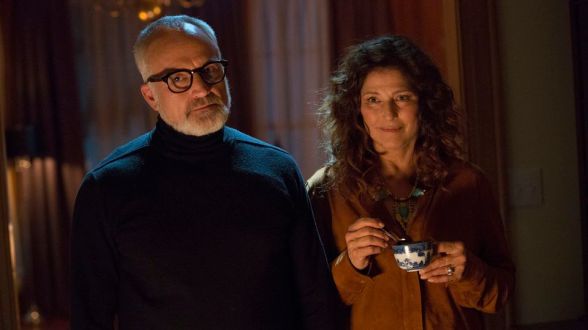Writer/director Jordan Peele’s clever and ambitious “Get
Out, “ one of the only horror films to directly address race and racial
relations, deals with a very specific kind of racism. I’m not talking about
overt racism perpetrated by White Nationalists or Neo Nazis, or even apathetically
tinged racism (someone seeing an article about the anniversary of the Selma
march and saying “who cares?”) but a kind of indirect racism born out of awkwardness
and naiveté. Usually, the perpetrators are trying so hard not to come off
racist or offensive that they end up saying indirectly racist/patronizing
things to whomever they’re interacting with, alienating that person, making
them into “the other.”
This kind of racism is more fascinating than the overt,
angry kind because the people who do it (often times well meaning, privileged
white people who fall on the liberal spectrum of politics, but not all of
course) don’t consider themselves to be racist. They might even become
defensive, saying things like: “I have a black friend!” or “I love black
culture!” Therefore, they don’t fully know what they’re doing.
Out of this complex, understated form of racism emerges “Get
Out,” a feverish genre piece that can be described as “Guess Who’s Coming to
Dinner” by way of “The Stepford Wives,” and even that description doesn’t
adequately cover all the delectably absurd and disturbing turns Peele’s script takes.
We see this indirect racism immediately in the interactions
between protagonist Chris (Daniel Kaluuya) and his white girlfriend Rose’s
(Allison Williams) affluent parents, Missy (Catherine Keener) and Dean (Bradley
Whitford, with snow-white hair and a beard, wearing big black glasses). Chris
and Allison are visiting Dean and Missy for the weekend, staying at their
massive estate in the midst of a secluded suburb, populated by other affluent
white people.
There’s tension in
the air. Dean is dorky and awkward, trying to make polite conversation with
Chris, but the things he says carry a racial undercurrent—he uses the phrase
“my man” constantly when addressing him, and at one point brings up the fact
that his maid and house keeper are black (and how “weird” is is since he and
his wife are white. Yeah…dude, just stop talking) even though Chris never
brings it up. He makes things even more awkward when he tries to emphasize that
he’s not racist saying, “I would have voted for Obama for a third term.” Chris
takes these comments in stride, staying calm and collected. But things get weirder
as the weekend goes on and Chris finds himself increasingly alienated from the
family.
In the traditional sense “Get Out” isn’t very scary. It’s
suspenseful and creepy at times but it’s never terrifying or dread inducing the
way a straightforward horror film like “The Shining” is, instead falling more
on the side of horror-comedy. In fact, a
lot of times it plays like a parody of horror/suspense films; there are a
handful of jump scares throughout that feel ironic. Thankfully, it’s a hell of
a horror comedy; first time director Peele has a knack for creating tense,
awkward interactions between his characters that are both amusing and quietly
eerie, and delivers a handful of gnarly, over the top kills.
Get Out” is also an
inventive, thought-provoking social satire. Peele playfully critiques various
clichés and stereotypes associated with African American culture and
communities (the ignorant assumption that all black people know each other, for
example) without being heavy-handed, and addresses the topics of slavery (a
much covered subject in film) and racial superiority in the context of genetics
in bizarre and unexpected ways.
The cast is great across the board. Relative newcomer
Kaluuya gives a sturdy, understated performance, while Whitford is a hoot. At
the beginning his Dean resembles an affluent, intellectual Michael Scott but
slowly gets more sinister and poised. Meanwhile, Keener is effortlessly
mysterious and evolves into the creepiest presence in the film. And then there’s
LilRel Howery as Chris’s concerned best friend Rod, who pretty much steals
every scene he’s in with his flawless comedic timing. It’s weird to call him
“comic relief” in a movie that’s fairly comedic already but his fast-talking,
semi dopey presence certainly helps to ease tension.
Admittedly, the climax does get to be a little messy. It’s
still satisfying from a dramatic perspective but it can’t help but feel
needlessly excessive and relentless at the same time. And there are other minor
bumps and blemishes throughout the film, but it doesn’t matter in the long run
because “Get Out” is a bold, entertaining, suspenseful and intelligent film. You
can enjoy “Get Out” for its surface-level thrills and eccentricities but you
can also look deeper--dissecting and analyzing its meaty racial subtext.

No comments:
Post a Comment